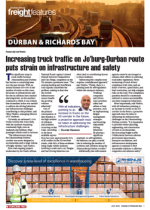The critical need for an efficient rail network to alleviate truck congestion and promote sustainable transportation between the Port of Durban and Gauteng must be balanced, according to Transport Minister Sindisiwe Chikunga.At the recent Road Freight Association (RFA) conference, she said the bustling corridor was facing significant challenges and that heavy reliance on trucks for cargo transportation had reached unsustainable levels.“The success of trade within our borders and beyond depends on a safe, reliable, efficient and dependable transport system.” With this in mind, the government was reviewing the National Land Transport Act (NLTA) to primarily structure the land transport systems into one uniform system with a centralised database. This included prescribed national principles, requirements, guidelines, frameworks and national norms and standards that would have to be applied uniformly across provinces and municipalities. “The DoT, together with the Road Traffic Management Corporation, is in the process of developing the National Operator Registration System, the purpose of which is to reregulate the road freight sector as the only deregulated freight transport mode to date (since 1988). This is necessary to achieve quality-regulated competition, enhance the enforcement processes, and encourage voluntary compliance.”Chikunga said a rebalance of the road-to-rail freight was necessary. The movement of Transnet Freight Rail to the Department of Transport was urgent in this regard. “We have to move more cargo by rail,” she said. “Yes, if TFR is moved to the DoT, we will have an extensive department, but migrating more cargo to rail will be much easier. Coal can no longer be moved to the Port of Richards Bay via road. No coal in this country should be on the road. If one looks at the N2 from Ermelo to Richards Bay, it is a nightmare. It is only in South Africa where coal is transported like this.”

